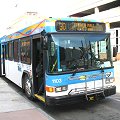- By Patty Poist
- News
 Print
Print  TCAT will bring in up to 10 professional transit contract drivers in the coming weeks to bolster its ranks and to address a shortage of bus operators that is being experienced on the local, regional and national levels. The use of temporary professional contract drivers will help TCAT maintain its high levels of service.
TCAT will bring in up to 10 professional transit contract drivers in the coming weeks to bolster its ranks and to address a shortage of bus operators that is being experienced on the local, regional and national levels. The use of temporary professional contract drivers will help TCAT maintain its high levels of service.The TCAT Board of Directors unanimously approved a resolution Thursday at its regularly scheduled board meeting, to enter into a contract with California-based National Tour Integrated Resources.
National Tour, which has professional transit bus operators in New York State and all over the country, will provide TCAT up to 10 bus operators for a three-month period, with an option for TCAT to extend the contract for an additional three months.
TCAT's arrangement with National Tour will respect TCAT's contract with the United Auto Workers Local 2300, the union representing both TCAT's bus operators and maintenance crew. The temporary bus operators will fill in leftover work assignments only and not take any work away from TCAT bus operators. At present, TCAT Acting General Manager Alice Eccleston is surveying bus operators to determine whether they want to retain their work assignments, some with built-in overtime, which they signed up for in August. Survey responses will determine the exact number of bus operators TCAT will need to fill gaps, which could be 10 or fewer, dependent upon what TCAT bus operators decide. At present, TCAT needs 82 bus operators to fulfill current service, but only has 73 bus operators on staff (seven of whom are out on leave or in training.) While some bus operators willingly sign up for overtime, others said they are tired of being mandated to work on their days off when there are bus operator shortages.
"For some, getting closer to a 40-hour work week is ideal, yet there are others who wish to retain their assignments with built-in overtime," Eccleston said. "Our goal is to leave the decision up to the workforce on how we will proceed and how many contract bus operators to hire."
In approving the hiring of an outside agency, the board noted that using contract bus operators is only a short-term "relief valve." While the contract workers are here, the board directed TCAT staff to continue to make recruitment a top priority and to examine service to see whether adjustments should be made to deal with what national experts deem will be a long-term challenge for transit agencies across the country.
TCAT has been and continues to add to its recruitment efforts in a number of ways, the most recent of which have been holding open job fairs at Green Street Station, TCAT's major hub downtown, which took place on Oct. 15, Oct. 20 and Oct. 21.
Eccleston said that National Tour bus operators are trained and experienced in driving transit buses and will only require a week or so of training at TCAT to become familiar with routes and TCAT's fare collection system. She said she expects them to begin in-service driving in mid-November.
Eccleston also thanked the many stakeholders with whom she consulted over the past several weeks to address the shortages. She said the UAW's leadership pulled together a group of bus operators to meet with her on Sept. 25. In addition to meeting with bus operators, Eccleston has been in continuous discussions with the TCAT Board and brainstormed with all TCAT employees in series of open meetings she initiated in recent months. Eccleston also created a task force made up of TCAT managers to find solutions. Earlier this month, in a special meeting, the TCAT Board directed TCAT staff to negotiate a contract with National Tour for its final consideration and subsequent approval today.
"We have long had a great reputation as being able to offer 'big city" transit service in a small community and we are striving to keep that record," TCAT Board Chairman Frank Proto said. Proto noted that TCAT's ridership grew 40 percent over the past decade with little increases in funding, and, in that time period, implemented only one fare increase in 2012 for rural riders as it is more costly to provide service to rural areas.
v11i42



